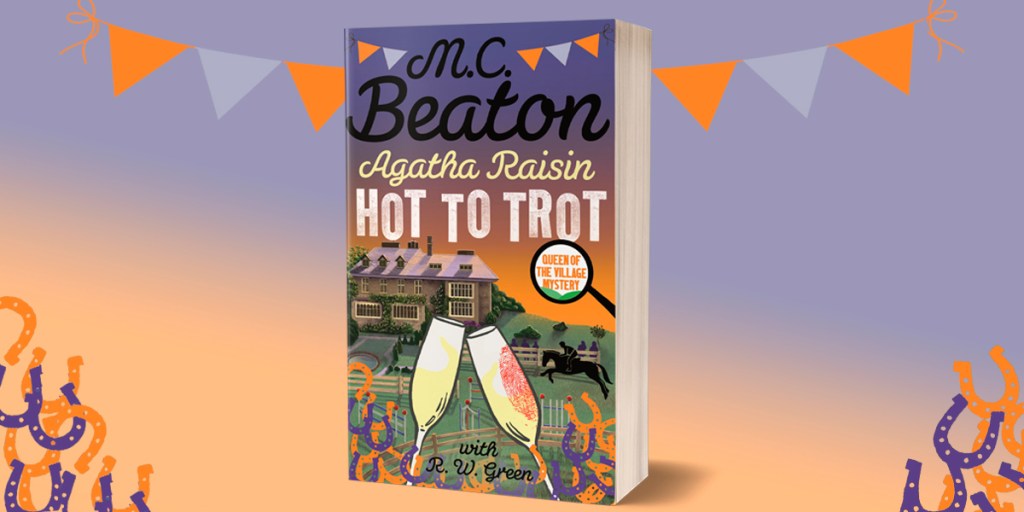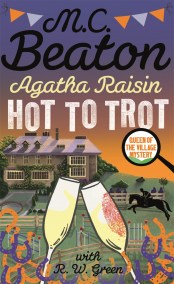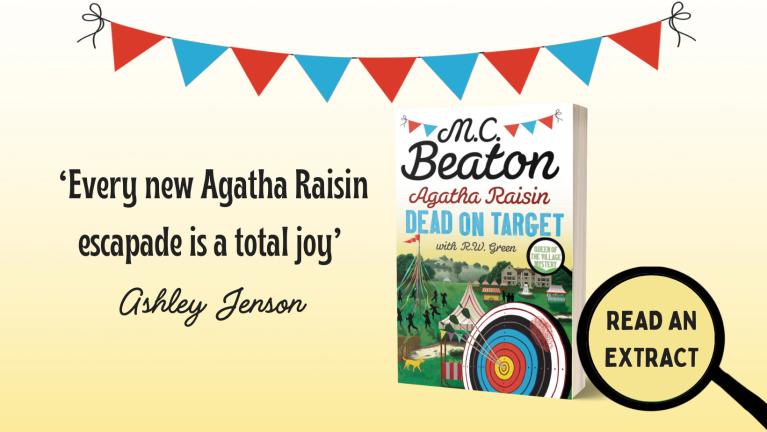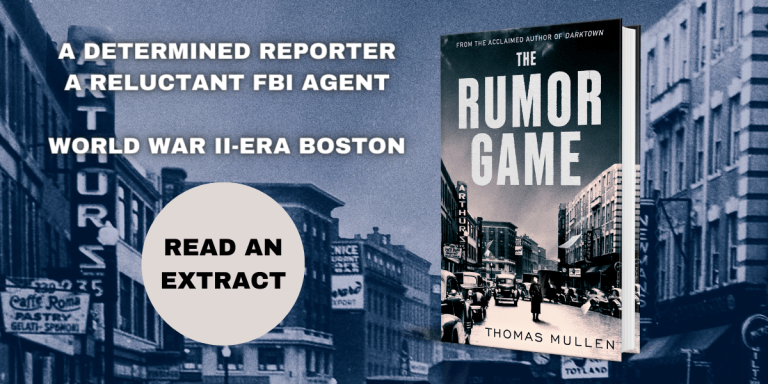Read an extract of Agatha Raisin: Hot to Trot by M.C. Beaton

Chapter One
No one knew. No one who encountered Agatha Raisin striding purposefully along Mircester High Street on this gloriously sunny spring morning, her brown hair sleek and lustrous in its neat bob courtesy of a pre-breakfast appointment with her hairdresser, could possibly have known. No one could even have suspected that the woman in the elegantly cut navy-blue jacket and skirt, carrying a dusky-pink shoulder bag that very nearly matched the colour of her lipstick, who was smiling and nodding pleasantly to passers-by, was hiding a dark torment.
Only Agatha knew how bitter and betrayed she felt about the way her long-time friend and sometime lover, Sir Charles Fraith, had committed to marrying a woman almost thirty years younger than her. Only Agatha knew, and that, she had decided, was how it was going to stay. I am a successful, independent woman, she told herself. I don’t need to lumber myself with regret over Charles’s mistakes. I need to get on with my own life. Wasn’t it Coco Chanel who said, ‘A girl should be two things – who and what she wants’? Well, that and the little black dress were two things she definitely got right. I am a private investigator with a thriving business to run and I will live my life the way I choose. Anyone who doesn’t agree with that can go to hell – and that includes Sir Charles Fraith! At that precise moment, Agatha almost believed herself.
Reaching the corner of an ancient cobbled lane that tumbled away from the high street down a shallow slope, Agatha looked up to the first-floor windows of Raisin Investigations. She could see her staff milling around, preparing themselves for the working day. She tiptoed, as elegantly as she could manage, the three or four steps it took to cross the cobbles, avoiding embedding the high heels of her dark-blue suede shoes in the evil cracks between the stones that she knew were lurking there, booby traps for the unwary. Reaching the sanctuary of the pavement outside the antiques shop above which were her offices, she caught her reflection in the shop window. A little stocky, perhaps, she admitted to herself, but what could you expect after a long, cold winter eating hearty meals? She would easily lose a few pounds now that salad season was approaching. She tugged at the hem of her jacket to straighten an imagined bulge, gave herself a nod of approval and made her way upstairs.
‘Morning, all!’ she announced, bustling into the office. Everyone looked towards her and responded. Toni Gilmour, Agatha’s Girl Friday, was young, beautiful, blonde and a meticulous detective with a good eye for detail. Agatha had come to rely on her a great deal, although that was something she seldom admitted to anyone, especially Toni. Patrick Mulligan was a tall, cadaverous retired policeman with a wealth of experience as an investigator. He had a serious, almost sombre demeanour and seldom smiled. Simon Black, on the other hand, greeted Agatha with a wide grin that wrinkled his features. He had an odd, pale, angular face that Agatha could never describe as handsome, yet he was a young man who was never short of attractive girls hanging on his arm or warming his bed – or so he claimed. The only girl he ever seemed to care about, however, was the next one. As an investigator, he had his shortcomings, but his casual charm and dogged determination usually saw him through.
Mrs Freedman, Agatha’s secretary, who handled most of the company admin, stepped forward to offer her a blue plastic document wallet. A middle-aged woman with a kindly expression, Helen Freedman was hard- working and efficient, and appeared to know by instinct precisely when Agatha wanted either a cup of coffee in the morning, a cup of tea in the afternoon, or a gin and tonic whenever.
‘Some invoices for you to approve,’ she said, ‘a couple of letters to sign, and can I remind you that you need to submit your expenses?’
‘Thank you, Helen,’ said Agatha. ‘I’ll sort that out later today. All right, everyone! Case conference catch-up in my office in ten minutes.’
She crossed the open area to her own separate office, pushing open the door. The small room was dominated by a huge wooden desk that had aspirations to being Georgian but, sadly, had been made three hundred years too late. She dropped the blue wallet on the desk beside her large cut-glass ashtray. It had been several months since she had last smoked a cigarette and at one time she had banished all ashtrays to drawers and cupboards, keeping the smoking accoutrements out of sight and out of mind. This one, however, she retained as a kind of trophy, now used only as a paperweight, the glass sparkling clean, a reminder of her triumph over tobacco. Settling into her chair, she took a copy of the local newspaper from her bag and unfolded it. ‘Society Wedding of the Year’, announced the headline. ‘Sir Charles Fraith to marry in lavish ceremony at Barfield House.’ Agatha sighed. So much fuss. Charles’s vile fiancée, Mary Darlinda Brown-Field, was making sure that her wedding was being splashed across the pages of every rag whose editor she could charm, coax, buy or bully. The article was accompanied by a photograph of them together. Charles had a vague, haunted expression, while Mary – well, the giant chin she had inherited from her father and the eyes that were set just a little too far apart meant that she would never win the Mircester Maids beauty contest. Yet the way she was holding on to Charles’s arm demonstrated her determination to make this the biggest wedding ever covered by the Mircester Telegraph.
It wasn’t even as if Charles hadn’t previously had a lavish ceremony at Barfield House. Agatha had scuppered that one by turning up with the Spanish waiter who was the rightful father of the pregnant bride’s unborn child. This time, however, there seemed no way of stopping Charles from plunging himself into a life of misery. This was a marriage of convenience, a financial transaction that he saw as a way of propping up his ailing estate. Yet the bride’s family’s money could never buy them that which they craved – the social status denied them by their lowly pedigree. The mar- riage was a sham, and Agatha worried that Charles risked losing control of the house and estate that had been in his family for generations. Yet she had made little effort to extricate him from this latest predicament, and now there was no time. The wedding was on Saturday – only forty-eight hours away.
Her staff filed into her office carrying cups of coffee and dragging chairs close to her desk. Mrs Freedman provided Agatha with a coffee, then returned to the outer office.
Toni sat closest to Agatha. She glanced at the news- paper lying on the desk and reached out to turn it towards her in order to read the smaller print. Agatha placed the blue document wallet on top of it and Toni looked up to see her boss staring impassively at her. She glanced away and sipped her coffee. Clearly the wed- ding was not a topic for open discussion.
‘Right,’ said Agatha. ‘Let’s start with the Chadwick divorce case. You’ve been keeping tabs on Mrs Sheraton Chadwick, Simon. What sort of woman are we dealing with?’
‘She has the look of someone who likes a bit of rumpy- pumpy, if you know what I mean,’ said Simon, grinning and cocking an eyebrow.
‘I’m not sure that I do know what you mean,’ said Agatha innocently. ‘Have you any ideas, Toni?’
‘Rumpy-pumpy? I can’t be certain,’ said Toni, taking her cue from Agatha and adopting a naïvely perplexed expression, ‘but it sounds like one of those phrases they used in old British black-and-white movies.’
‘Ah, yes,’ Agatha agreed. ‘Like “slap and tickle” or “hanky-panky”. Simon, do you mean that she seemed to you like the sort of woman who might enjoy an enthusiastic illicit sex life?’
‘Yes,’ said Simon, squirming slightly. Patrick Mulligan raised a hand to his mouth to cover one of his rare smiles. ‘Yes, that’s what I mean.’
Agatha placed the palms of her hands on her desk and leaned forward slightly, fixing Simon with her dark bear-like eyes. ‘Let’s keep the language we use at meetings a bit more formal, shall we? If we get sloppy when discussing cases, there’s every chance one of us might slip up when talking to a client and say something out of turn. We can’t have people thinking that we treat our work like some kind of joke. That would definitely be bad for business.’
‘Sorry,’ Simon apologised, sitting up straight, a slight flush colouring his cheeks. ‘I will watch how I . . . um . . . phrase things in future.’
‘Good,’ said Agatha. ‘How has the surveillance been going?’
‘I haven’t had much luck yet. Mrs Chadwick has been visited by a bloke at a rented house in Oxford.’
‘And do you have photographs of this . . . bloke?’ ‘I’ve seen him, but I could never get a shot of his face
that could be used to identify him,’ Simon admitted. ‘I did get the number of the car that dropped him off and picked him up, but he’s out of the vehicle and into the house like a flash.’
‘Okay, let’s move on,’ said Agatha. ‘Patrick, where are we with the Philpott Electronics case?’
‘The company chairman, Sidney Philpott, has concerns about his new managing director, Harold Cheeseman,’ said Patrick, sliding a manila folder across the desk. ‘He has asked us to carry out a discreet background check. So far Cheeseman’s CV and references all appear to be genuine. He left his last job to take up a post in Australia, but told Mr Philpott that he came back because Australia was not to his wife’s liking. He’s definitely lying about that.’
‘What makes you say that?’ Agatha asked, flicking through the report.
‘His wife is dead,’ Patrick explained. ‘She died long before he left for Australia. That was one of his reasons for going – to make a fresh start.’
‘It’s a weird thing to lie about,’ said Agatha.
‘He may have his reasons,’ Patrick conceded, ‘but I’m not at all sure about him. From the way the staff say he has been acting at work, there’s something odd going on. I’ve sent a couple of emails to Australia to find out what he got up to there, and I’m tracking down some of his old friends here.’
‘Okay,’ said Agatha. ‘Stay on it.’
There was a handful of other ongoing cases to discuss, mainly divorces and missing pets, before Agatha turned to Toni.
‘So, Toni,’ she said. ‘Any potential new cases that I haven’t yet heard about?’
‘We have been contacted by a Mr Gutteridge, who runs a biscuit and cake factory near Evesham,’ said Toni. ‘He wants us to install listening devices in the workers’ canteen because he thinks the staff are saying nasty things about him and his secretary.’
‘Are they having an affair? What sort of things does he think they’re saying?’
‘He denies any affair. She comes from Geneva, and graffiti in the ladies’ loo calls her his “Swiss roll”.’
‘I don’t want to get involved in that,’ said Agatha, shaking her head. ‘I don’t mind us sweeping a place to remove bugs, but I won’t plant them in order to eavesdrop on ordinary people simply to deal with office gossip. Anything else?’
‘We have a Mrs Jessop, who believes that a poltergeist is rearranging her kitchen cupboards and digging up her garden.’
‘A poltergeist?’ said Agatha. ‘A ghost? Creepy, but interesting.’
‘And,’ said Toni, ‘Mrs Fletcher, who lives just outside Carsely, wants us to investigate someone dumping at the bottom of her garden.’
‘Dumping?’ said Patrick. ‘You mean fly-tipping? Leaving piles of rubbish? That’s a matter for the local council, isn’t it?’
‘No, not fly-tipping,’ said Toni. ‘Someone has been having a dump. Leaving piles of excrement. Quite a lot of it, she says.’
‘That’s disgusting,’ said Agatha, wrinkling her nose. ‘Who would do a thing like that?’
‘She has no idea,’ Toni explained, ‘but the piles are being added to on a regular basis in the middle of the night.’
‘Right,’ said Agatha, drawing the meeting to a close. ‘Let’s keep everything moving forward. Patrick, can you use your contacts to try to trace the car that dropped off Mrs Chadwick’s visitor? Toni and I will take over the Chadwick case to see if we can make some progress there. We will also find out if Mrs Jessop’s poltergeist is worth investigating. Simon, you can take on the case of the phantom pooper.’
‘But that’s . . .’ Simon’s objection wilted under the weight of Agatha’s withering stare.
‘Yes, I know – it’s a shit job,’ she said, ‘but somebody has to do it, and the quicker you clear it up, the sooner you can move on to something else.’
Simon and Patrick dragged their chairs away, heading for the door, but Agatha motioned Toni to stay.
‘I need you to get up to speed on the Chadwick case,’ she said. ‘Give me a call later and we can meet up to stake out that house tonight. I will be out of the office this afternoon.’
‘Are you going to see Charles?’ ‘That’s none of your business.’
‘You really have to try to talk to him . . .’
‘I don’t HAVE to do anything of the sort!’ Agatha scowled, a note of anger in her voice.
‘You need to do something,’ said Toni. ‘This has been plaguing you for months. You had a thoroughly miser- able Christmas and you’ve been on edge ever since. You need to come to terms with what’s happening.’
‘I am perfectly capable of deciding what I will or will not do, and I certainly do NOT need personal advice from someone as young as you – someone who was still in nappies when I was being wined and dined by some of London’s most eligible bachelors!’
‘And how did that work out?’ said Toni, struggling to subdue her own rising temper. ‘You ended up abandon- ing London to live in the Cotswolds. Look, we’ve been through a lot together and I care about—’
‘I don’t need you to care about anything except your work!’ barked Agatha. ‘I shouldn’t have to explain—’
‘Well I’m SO sorry!’ Toni snapped. ‘It must be very difficult explaining anything to someone as young as me!’ ‘Not at all,’ said Agatha, ‘but I left the crayons and colouring books at home today.’
Toni stormed out and Agatha snatched the newspaper from the desk, hurling it into the waste-paper basket. She knew that Toni was trying to help, motivated by the best of intentions, but the situation with Charles had been festering for so long that the slightest mention of it plunged her into a cauldron of fury. With a sigh, she reluctantly admitted to herself that Toni was right. She needed to clear the air with Charles, for her own peace of mind. Still, that would have to wait. She reached for the blue plastic folder.
That afternoon Agatha drove out of Mircester along the road toward Carsely. The sun shone bright and clear in the pale-blue spring sky and newborn lambs tussled shakily with each other in the fields. The hedgerows were sprouting green, and here and there wild flowers decorated the roadside – a blush of red clover, dainty white primroses and glimpses beyond the hedges of bluebells beginning to carpet the woodland. She turned down a narrow, winding side road that led to the gates of Barfield House. The ornamental wrought-iron gates stood open, as ever, leaning drunkenly away from their hinges on the tall stone gateposts, the bottom edges buried in tall grass.
The trees that lined the long driveway eventually opened onto the landscaped lawns surrounding the house, allowing the building space to breathe. On the manicured grass stood the biggest marquee that Agatha had ever seen. Tented pavilions of various shapes and sizes were not a rare sight in Barfield’s grounds. The house hosted local fairs, agricultural shows and a plethora of community events. Charles had always said that while he owned the house and the estate, they really belonged to the local people. He regarded himself as something of a caretaker – an enormously privileged caretaker, Agatha mused, but a caretaker nonetheless. Marquees, therefore, regularly graced Barfield’s lawns.
There was, however, a distinct lack of grace about the monstrosity that now stood there. A team of workmen hauled on ropes and hammered at wooden stakes to secure the acres of canvas. Flags, pennants and bunting fluttered from every upright, and the great round roof was a hideous segmented pink-and-white candy-striped eyesore. It looks, Agatha thought, bringing her car to a halt in order to gawp at the thing, just like a . . . It is! It’s a circus tent! They’re holding the wedding in a big top! How appropriate – Mary has opted to turn her charade of a wedding into a circus! Send in the clowns!
Agatha rolled the car onwards. Even Barfield House, the huge Victorian edifice built in what the architect must have imagined to be a romanticised representation of a grand medieval mansion, did not deserve to have the garish circus tent inflicted upon it. Charles had always agreed with her that the house was not particularly pleasing on the eye, despite its multitude of mullioned windows twinkling in the sunshine, but Agatha was aghast at the bizarre tent sprawling on the lawn below. It simply looks awful, she thought. It’s as though the old house has hitched up her lawn to flash her knickers. It’s . . . vulgar.
She parked near the stone steps leading to the heavy black-studded oak door that was Barfield’s main entrance. Charles seldom used this door, and had shown Agatha many other ways into the house, but, having arrived unannounced and uninvited, she decided that this was her only option. Rather than risk her pristine nail polish with the large cast-iron knocker, she pressed the electric bell push set into the door frame. Almost immediately, she heard the familiar click of Gustav’s heels crossing the polished floor of the vast hall. A combination of butler, household manager and handyman, Gustav had served Charles’s father and had become almost part of the fabric of the building. Agatha knew that Charles saw him as indispensable, yet she and Gustav had always been, at best, sworn adversaries.
‘Oh,’ said Gustav, opening the door. ‘It’s you.’
‘What a pleasure it is to see you again too, Gustav,’ Agatha smiled. ‘Have you missed me?’
‘Sir Charles is not at home.’
‘Is that not at home to me, or not at home at all?’
‘He is in London, staying at his club. He and some old friends are having a stag party.’
‘Shame,’ Agatha sighed. ‘I was hoping to have a word with him.’
‘I think . . .’ Gustav hesitated, glancing nervously over his shoulder. ‘I think you had better come in. We should talk.’ He reached out, grabbed her by the arm and yanked her inside, marching her briskly across the enormous expanse of the hall.
‘Hey, what do you think you’re—’
‘Shh!’ Gustav hissed, raising a finger to his lips. ‘In here, quickly.’
He opened a door near the back of the hall, close to where Agatha recalled a large, bright, modern kitchen. The door led into a long, narrow room that was little more than a corridor. Wooden panelling, cupboards and worktops flanked a central gangway that opened out to a wider room where two Belfast sinks, with tall brass taps, stood below a frosted-glass window. There was a small kitchen table and two chairs. Gustav thrust her towards one.
‘What the hell are you playing at?’ Agatha demanded. ‘You can’t just drag me in here and—’
‘Keep your voice down!’ Gustav breathed. ‘The walls have ears in this house nowadays. This is the only place where it is even remotely safe for us to talk. If they knew you were here, the buggers would boot me out without a second thought.’
‘What is this place?’ Agatha asked, looking around her. ‘And who would boot you out? The Brown-Fields?’ ‘It’s the old butler’s pantry,’ Gustav explained, lowering himself into the wooden chair opposite Agatha. She watched him settle and cross his legs. He moved, as he always had done, with the elegance of a dancer. He had the strength of an athlete, too. Agatha massaged the top of her arm where he had held her in a vice-like grip. ‘Yes,’ he said grimly, ‘the Brown-Fields would love to have an excuse to send me packing, so we must keep this brief. I will not offer you tea.’
‘Gustav, what’s going on?’ Agatha asked. ‘We have never exactly been the best of friends, but I don’t like to see you behaving like this. You’re not acting normal.’
‘There is nothing normal about what’s going on in this house! We may never have been friends. We may never be friends, but I know there is one thing we both genuinely care about.’
‘Charles.’
‘Sir Charles. He is in London, as I said. So is that obnoxious little cow he is about to marry. She is partying with her friends and having a final dress fitting. “Miss Mary” is what she has decreed I should call her. After the wedding, it is to be “Your Ladyship”. Can you imagine? Who does the little bitch think she is?’
‘I take it her parents are here? I know they’ve moved in.’
‘They are using a suite of rooms in the east wing as their apartment. I have been instructed to refer to them as Mr Darell and Mz Linda. Mz? I mean, what sort of a bloody title is that? Sounds like a bee farting. These people are scum – mongrels – no breeding whatsoever.’ ‘That’s rich coming from a humble servant with a Hungarian father and an English mother,’ Agatha scoffed.
‘You mean me?’ Gustav frowned. He was notoriously secretive about his past. ‘Who told you my father was Hungarian?’
‘Bill Wong.’
‘The policeman? Well, he doesn’t know everything, does he? Anyway, this isn’t about me. This is about Sir Charles.’
‘Oh bollocks!’ Agatha groaned, then caught Gustav’s furious look. ‘Not you, Gustav – them. Darell and Linda. It’s Mary’s middle name, isn’t it? Half her father’s and half her mother’s – Darlinda.’
‘Have you only just realised? Not much of a detective really, are you?’ Gustav frowned, then returned swiftly to his subject. ‘They are destroying Sir Charles, Mrs Raisin. That little bitch is constantly on his back. If she’s not nagging him about this outrageous wedding, she’s telling him how he should run the estate – and her father is always on hand to back her up. They never give him a moment’s peace. I don’t believe Sir Charles is actually in London celebrating his forthcoming marriage. I think he has gone there simply to get away from these dreadful people.’
‘Maybe he won’t come back.’
‘He will be back. He dare not do anything to jeopardise this farce of a wedding. They have a terrible hold over him.’
‘So I believe,’ Agatha agreed, ‘but he wouldn’t discuss it with me.’
‘Nor me,’ Gustav admitted, ‘and I pride myself on always having been his closest confidant.’
‘Your advice hasn’t always been entirely welcome. You tried to poison my relationship with Charles more than once because you didn’t see me as a suitable lady of the manor. I hated you for that.’
‘I neither expected nor required you ever to like me, Mrs Raisin. My duty is to protect the best interests of Sir Charles Fraith.’
‘Well that’s not been going too well over the past few months, has it? You’ve let the Brown-Fields start to rule the roost here at Barfield. How is his aunt taking it all?’ ‘Mrs Tassy scarcely appears downstairs nowadays.
She even takes her meals in her room. I fear this may be the end of her.’
Agatha was shocked. Charles’s aunt was a tall, wil- lowy woman whose pale face and silver hair gave her the look of someone who had never been anything less than what was referred to in polite society as ‘a certain age’. Yet Agatha knew the old lady was as strong as a horse. She hated to think of the Brown-Fields clipping her wings when she was as much a part of Barfield House as the grand staircase or the portraits in the library.
‘We have to stop these devils, Mrs Raisin!’ Gustav’s hands clenched into fists. ‘When I think of that hideous creature Sir Charles is about to marry, it makes me so angry. She struts around the house making notes about changes she will make. Oak panels to be ripped out. Furniture and rugs to be discarded. I could slap her stupid face!’
‘There’s a lot to slap.’
‘Without doubt. A chin like a sideboard.’ ‘With the bottom drawer open.’
‘Honestly, I wake at night having dreamt about wringing her neck.’ He made a strangling motion with his hands. ‘We must rid Sir Charles of these utter scumbags, but I am at a loss to know how.’
‘Well, I doubt we can stop the wedding at this stage,’ said Agatha, ‘but marriages don’t last forever.’ She handed Gustav her business card. ‘Here’s my number. Keep in touch. Don’t do anything silly and go riding off on that motorbike of yours.’
‘I won’t,’ said Gustav, calming himself. His prized Harley-Davidson had been a gift from Charles. Agatha wanted to remind him that his years of devotion to the Fraith family were appreciated and had been rewarded. She needed to use that loyalty to stop him from doing anything rash. He had once run off to work briefly in Switzerland when Charles had become engaged to some poor girl of whom he did not approve. How he had managed to keep himself under control this time was a miracle.
‘I need you here,’ said Agatha, rising to leave. ‘I need you as my eyes and ears in this house. If we work together, maybe we can find a way to drag Charles out of this mess.’
‘Very well.’ Gustav directed her to a small door that led to a courtyard at the side of the house. ‘You had best leave this way. Less chance of you being spotted.’
Once back in her car, Agatha drove past the big top and on down the avenue of trees, slowing to a halt by the main gates. She scrabbled in her bag for her mobile phone.
Roy Silver was sitting in his office at Pedman PR, idly gazing out of the window at the London traffic grumbling in gridlocked paralysis three storeys below. He sipped lapsang souchong from a china cup, enjoying the smoky pine flavour of the tea and contemplating the misery of joining the turmoil of commuters to make his way home. The warm spring weather was overheating the city, and if it continued, as it was forecast to do, the fumes and dust in the streets would become unbearable.
His phone rang and he reached a languorous arm across the desk.
‘Roy, it’s me,’ came the voice of Agatha Raisin. ‘I need you to do something for me.’
‘Aggie, darling!’ trilled Roy. ‘How lovely to hear from you. Are you enjoying the weather up there in the Cotswolds? It’s becoming horribly oppressive in the city.
It’s playing havoc with my sinuses and it doesn’t help that I am absolutely rushed off my poor little feet.’
‘Cut the crap, Roy. You’ve never done a proper day’s work in your life.’
‘Oh, times have changed, my dear,’ said Roy with a forced laugh. ‘Since you so kindly brought me in to handle Wizz-Wazz the Donkey, I have hardly had a moment to myself.’
‘I doubt that very much. I know you have an entire team working on that account and that you will be raking in a fine profit from it. So you owe me, and it’s payback time.’
‘Well, I may be able to spare a few moments. What’s it all about?’ Roy sighed, then suddenly perked up. ‘Not another juicy murder, is it?’
‘No. I want you to use every London contact you have to find out what hold the Brown-Fields have over Sir Charles Fraith.’
‘But Aggie,’ complained Roy, ‘we’ve been into all of that already. The old blimps at his club and those buzzards at the banks are giving nothing away.’
‘Try harder, Roy. There is a contract of some sort. Tempt some young lawyer out for a drink and ply him with tequila. Tell people that you’re looking to instruct new lawyers or accountants for your business and pump them for information. Twist a few arms. Cheat. Lie. Blackmail. The gloves are off. We have to know.’
‘That all sounds terribly serious,’ Roy said, his voice laced with delight at the thought of the intrigue. ‘I’ll get on to it straight away.’
Agatha eased her car out onto the road and set off for her cottage in Carsely. She had promised herself time and time again that she would not involve herself in Charles’s affairs. He had let her down so badly. He hadn’t even told her about getting engaged. How could he have treated her like that? And Gustav and Charles’s aunt have snubbed me so many times, she told herself, that I really shouldn’t care about them either. Yet none of them deserves Darell and Linda Brown-Field, or Mary Darlinda. I mean – Darlinda! Really? I simply can’t abandon Charles, no matter what sort of trouble he’s in. I have to do something!
Agatha smiled as she felt a warm glow in her chest. Now that she had committed herself, now that she was about to do battle, she felt more alive than she had done for months.
‘I got us some sandwiches,’ said Toni, offering Agatha a choice of two paper-wrapped parcels. ‘Coronation chicken or ham salad?’
Agatha chose the ham salad with a nod of thanks. Bearing in mind their exchange earlier that day, she had been treading lightly ever since Toni had arrived to pick her up. She had kept the tone of her voice soft and tried to maintain a calm atmosphere in the car. They were parked in a tree-lined street, which, judging by the size of the houses and the expensive cars parked in their driveways, was in a solidly affluent area of Oxford. The building opposite which Toni had parked was newer than the larger, mainly Victorian homes further down the street, part of a terrace of four recently built compact town houses on a spacious corner plot that must at one time, Agatha surmised, have been occupied by a single mansion house. Each was three storeys, with a wooden front door standing alongside a wide garage door.
‘It’s the one at the end,’ said Toni, unwrapping her sandwich. She placed the digital camera with its long lens on the dashboard behind the steering wheel. ‘Patrick says the car that dropped the male visitor belongs to a local cab company. They pick up a Mr Smith from the station, deliver him to this address and collect him later. He pays cash. I guess Smith is probably not his real name.’
She tucked into her sandwich. Outside it was growing dark, and the harsh light from the street lamps was tempered only slightly by the tinted glass of the car windows. It was not a flattering light, Agatha decided, yet her young companion still managed to look amazing. How could anyone look that good in this light? How could anyone look that good while she was eating a coronation chicken sandwich? Not for the first time, Agatha felt a pang of jealousy. A couple of years ago, they could have walked into a room together and she knew she would easily have stolen Toni’s thunder. Now, she thought, I could diet for a week, have my hair and make-up done perfectly, wear killer heels, knockout diamonds and that sheer silk dress with the plunging neckline, and I would still be invisible next to Toni.
Toni was wearing a simple black sweater and black jeans – practical attire for this sort of work. Agatha had intended to wear a pair of black cotton trousers, but over the past few weeks a series of microwaved lasagnes, more often than not with chips and half a bottle of Merlot, meant that no matter how hard she clenched her own teeth, the teeth of her trouser zip refused to come together. The black skirt she had chosen instead was only marginally less troublesome to fasten. She nibbled at the corner of her sandwich, feeling her waistband tighten with every swallow.
‘Toni,’ she said softly, ‘about earlier today. I—’ ‘Don’t,’ Toni interrupted, turning to face her. ‘Your
apologies always sound insincere.’
‘What do you mean, insincere?’ Agatha bristled. ‘My apologies are never insincere! My apologies are amongst the best in the business!’
‘That’s much better.’ Toni giggled. ‘That sounds more like the Agatha I know. I don’t want to work for a meek and mild Agatha Raisin. That would just be too boring.’ ‘Well.’ Agatha relaxed and smiled. ‘Let’s just say we both said some things and leave it at that. Friends?’ ‘Friends,’ said Toni. ‘Wait – look there! That’s the car!’
She grabbed the camera as a blue saloon car drew up and disgorged a single passenger, clearly male, of average height and wearing a coat with a high collar turned
He hurried up the three steps to the front door, which was opened to allow him entry without him even breaking stride.
‘That was smooth,’ said Toni. ‘I’m not surprised Simon couldn’t get a photo. I’ve got nothing either.’
‘We can wait for him to come out,’ said Agatha, ‘or we can try to get a look at what’s going on inside.’
‘What do you suggest?’
‘We could knock on the front door posing as market researchers,’ Agatha said, producing an official-looking clipboard from the footwell, ‘though I doubt our man is going to come to the door.’
‘Mrs Chadwick might,’ said Toni, ‘but it’s not her we need to photograph.’
‘I’ve seen houses like these before,’ Agatha reasoned, ‘and I know the layout. Ground floor is the garage, with a kitchen/diner and living room at the back opening onto a garden area. First floor has a small bedroom at the front, a couple of bathrooms, and master bedroom at the rear. Top floor has a couple of attic bedrooms and another bathroom.’
‘We can assume, then, that they’ll head for the master bedroom at the back.’
‘Let’s go take a look!’
They walked up a service access path at the side of the building, picking their way through a scattering of builders’ rubble and broken, discarded tools, evidence of the houses’ recent completion. Toni led the way, using a carefully shielded torch to light the clutter at their feet. A high fence ran back from the rear of the building, and looking up, they could see that the only light at the back of the house was in the window of the master bedroom.
‘We can’t see a thing through that window from this angle,’ whispered Toni.
‘No,’ Agatha agreed, ‘but we could use that.’ She pointed to a rickety ladder lying amid the builders’ rubbish. Making as little noise as possible, they dragged it to the side of the building and leaned it gently against the wall.
‘I’m going up,’ said Agatha, slinging the camera strap over her shoulder. ‘If I can squint round the corner, I should be able to see something and get a shot.’
‘Be careful, Agatha. It doesn’t look very sturdy.’
‘It’ll be fine as long as you hold on to it and check where I’m putting my feet.’
Agatha made her way steadily up the ladder, thankful that she had worn shoes with sensible, although not entirely flat, heels. Halfway up, with her feet higher than her head would normally be, she began feeling nervous and looked down. Toni was gazing out into the street.
‘Toni!’ she hissed. ‘You’re supposed to be watching where I put my feet!’
‘But if I look up, I can see right up your skirt . . .’ ‘You won’t see anything up there that you can’t see on
a rack in Marks and Spencer!’
‘Yes, but on the rack it’s not quite so . . . animated!’
Agatha tutted and climbed higher. Once she was level with the window, she gingerly poked her head round the corner. She had only a partial view of the room through the window, and through an open fanlight she could hear music playing – a country rock riff – and a plaintive voice singing ‘Saddle Up the Palomino’. Then Mrs Sheraton Chadwick strode into view. She looked to be in her early thirties and was wearing a black velvet riding helmet, black jacket with a jewelled horse brooch, white jodhpurs and gleaming black leather riding boots. She was tapping a riding crop against her thigh, a thin smile on her face.
Before Agatha lost sight of her, she distinctly heard the words, ‘Who’s been a naughty little pony then?’ And the response: ‘Bring it on, baby – I’m hot to trot!’
As she leaned further over to try to see more, the ladder creaked and wobbled, and she felt the urgent need to have her feet firmly on solid ground. She made her way quickly back down and turned to talk to Toni just as the ladder toppled over sideways, landing with a mighty crash amongst the builders’ rubble.
‘What was that? Who’s out there?’ Mrs Chadwick had flung open a rear window. ‘George – fetch the shotgun!’
‘Snakes and bastards!’ Agatha squeaked. ‘RUN!’ They bolted for the car.







